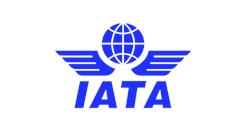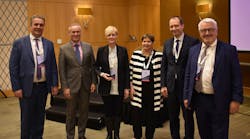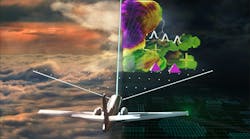Daytona Beach, Fla. / Prescott, Ariz., Feb. 26, 2013 – This fall, students in Embry-Riddle Aeronautical University’s flight programs in Daytona Beach, Fla., and Prescott, Ariz., will receive training in sophisticated motion-based full-flight simulators in preparation for new Federal Aviation Administration training requirements.
In Daytona Beach, students will be trained in a full-motion simulator from FlightSafety International in the campus’ Advanced Flight Simulation Center. Students at the Prescott campus train in full-motion simulators alongside airline crews in Phoenix.
The simulators replicate the cockpit and instrumentation of a regional airline jet and enable students to safely train for operations in realistic, difficult conditions, such as adverse weather. Training in a full-motion simulator ensures that students attain a significant amount of experience in a multi-crew environment while operating in difficult conditions
The Airline Safety and Federal Aviation Administration Extension Act of 2010 mandates all airline pilots to have an Airline Transport Pilot license that requires 1,500 hours of flight time including cross-country, night and instrument flying and completion of a training course.
However, under the FAA’s proposed rule, students at aerospace degree-granting universities like Embry-Riddle would have to accumulate only 1,000 flight hours to qualify for the ATP license. Embry-Riddle has created a special course that utilizes Level D flight simulators to help prepare its students for the ATP exam.
“The airline industry consistently reports that our airline pilot graduates are among the most highly regarded,” said Tim Brady, dean of the College of Aviation at Embry-Riddle’s Daytona Beach campus. “The addition of this simulator on campus will ensure that our graduates both meet industry needs and fulfill the FAA’s new requirements.”
“We will continue to provide motion-based full-flight simulator training so that our students gain familiarity with jet controls, systems and operations and the mastery of advanced decision-making skills they will need as airline pilots,” said Gary Northam, dean of the College of Aviation at Embry-Riddle’s Prescott campus, of its partnership with CAE’s Phoenix-based pilot training center.
About Embry-Riddle Aeronautical University Embry-Riddle Aeronautical University, the world’s largest, fully accredited university specializing in aviation and aerospace, is a nonprofit, independent institution offering more than 40 baccalaureate, master’s and Ph.D. degree programs in its colleges of Arts and Sciences, Aviation, Business and Engineering. Embry-Riddle educates students at residential campuses in Daytona Beach, Fla., and Prescott, Ariz., and through the Worldwide Campus with more than 150 locations in the United States, Europe, Asia and the Middle East. The university is a major research center, seeking solutions to real-world problems in partnership with the aerospace industry, other universities and government agencies. For more information, visit www.embryriddle.edu, follow us on Twitter (@EmbryRiddle) and www.facebook.com/EmbryRiddleUniversity, and find expert videos at YouTube.com/EmbryRiddleUniv.




